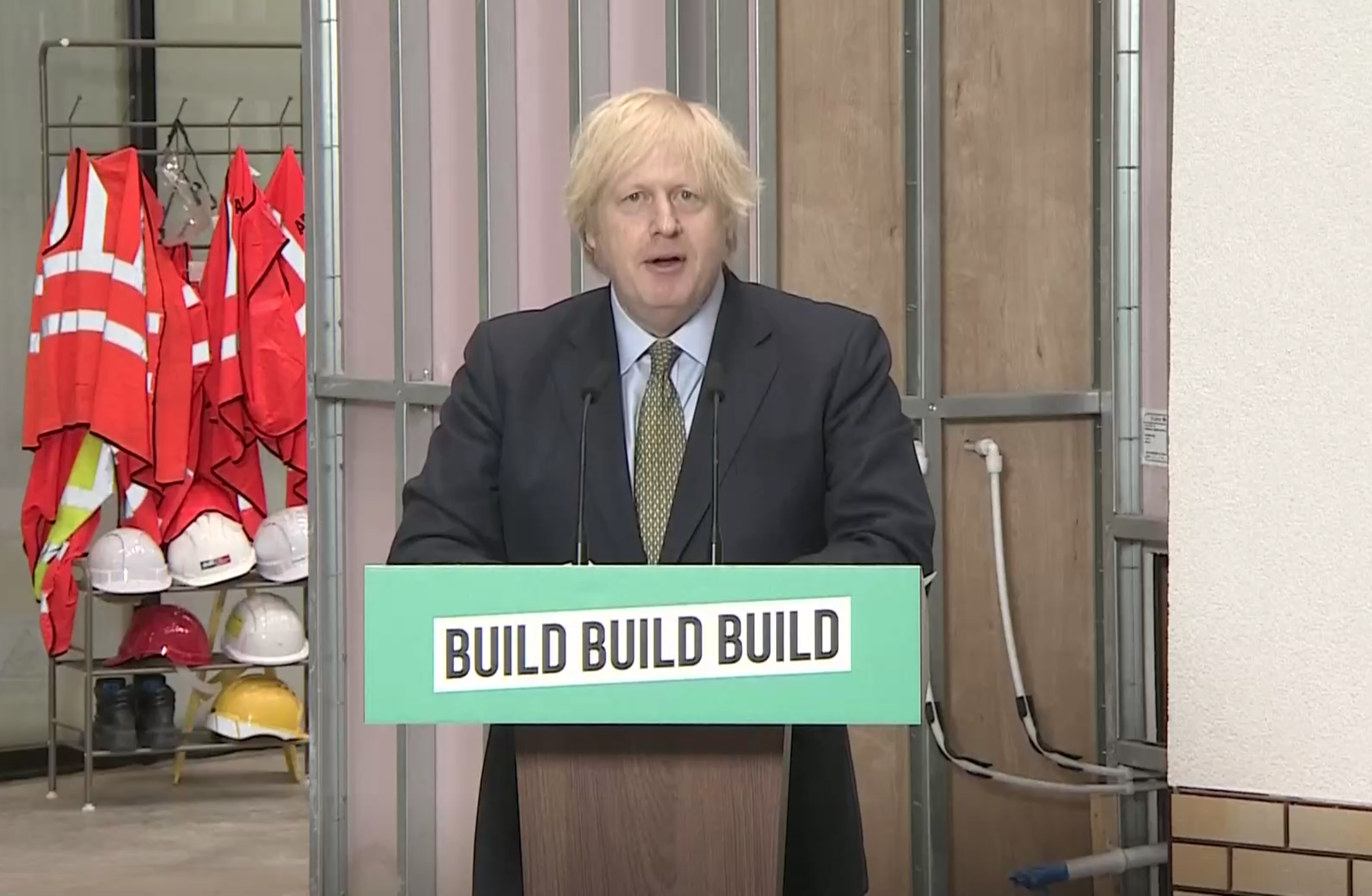Boris Johnson’s ‘new deal’ speech was his latest pitch for the New Labour centre ground
With all these confusions and distractions, it was hard to make out the central purpose of the speech – but it was aimed at certain voters, writes John Rentoul


When I say Boris Johnson‘s latest address was a New Labour speech, I don’t mean it was like one of Tony Blair’s in style. Blair would always try to make an argument in his big speeches. The best of them were exercises in persuasion, as he outlined the choices facing the nation and explained why he thought it needed to follow the course he was pursuing.
In construction, Johnson’s speech was more like one of Gordon Brown’s speeches. Brown’s drafting technique has been described by several scarred participants as a bolted-together assembly of paragraphs, simultaneously on several laptops and in a scissors-and-Sellotape paper version.
Johnson’s speech seemed as if something like one of Brown’s drafting sessions had been abandoned halfway through, and the prime minister had decided to deliver the bits he had in the best order that he could manage while he was at the lectern at Dudley College of Technology.
Thus the speech dotted about capriciously. Johnson managed to insert a reference to people who want to tear down Winston Churchill’s statue into a section about how his economic policy was not to attack successful companies or wealth creators: “I don’t believe in tearing people down any more than I believe in tearing down statues that are part of our heritage – let alone a statue of our greatest wartime leader – I believe in building people up.”
He crowbarred a line about ending “the lunacy that stops us deporting some violent offenders” into a short paragraph about “cracking down” – “again”, which was a strange word to add – on crime.
The greatest incoherence was the way the speech veered “all over the place like a shopping trolley” – a phrase Johnson was reported to have used to a colleague about his “in or out” decision on Europe in February 2016 – between the threat of coronavirus and the plans for rebuilding. The big idea of the speech was that the crisis had to be turned into an opportunity to speed up the infrastructure revolution that Johnson promised in the manifesto last year.
But the local lockdown in Leicester announced the night before forced him to start by explaining why he was talking about what would happen when the disease was beaten.
With all these confusions and distractions, it was hard to make out the central purpose of the speech, but it was a pitch for New Labour’s centre ground. The big clue was in the section in which Johnson disowned austerity: “We will not be responding to this crisis with what people called austerity; we are not going to try to cheese-pare our way out of trouble, because the world has moved on since 2008, and we not only face a new and in some ways a far bigger challenge … but this moment also gives us a much greater chance to be radical and to do things differently.”
In other words, his response to the economic disaster caused by the response to coronavirus would be more like Gordon Brown’s in 2008 than David Cameron and George Osborne’s. The Conservative opposition at the time argued against nationalising the banks, and claimed that Labour’s huge borrowing spree to keep people in jobs had gone too far. Cameron, Osborne and Nick Clegg came to office claiming that they needed to balance the government books more quickly than Brown and Alistair Darling had planned to.
Johnson’s conversion to the New Labour way came about partly because the British electorate has been through 10 years of “what people called austerity” and didn’t enjoy it much. That was one of the reasons Theresa May did so badly in the 2017 election, and one of the reasons Johnson did well in 2019 – when he emphasised higher spending on the NHS and schools.
As a result, the pendulum of public opinion, which was unsettled by the state of the public finances in 2010, has swung in Brown and Darling’s favour. Borrow while interest rates are low, and pay people to build things. The policy response to this economic crisis is nearly unanimous – not least because the main opposition party does not instinctively recoil from increasing the national debt.
Politically, the response is more than just flooding the economy with borrowed money: it is a New Labour moment. Politics is all about “schools and hospitals” with a side order of “tough on crime, tough on the causes of crime”. The day after Johnson won the election he went to Sedgefield, Tony Blair’s old seat, to celebrate its falling into Tory hands. He and Dominic Cummings now see the coronavirus crisis as a chance to “double down on levelling up” as Johnson put it in the speech.
No wonder the prime minister paused at one point in the speech to observe that “all this … sounds like a prodigious amount of government intervention”. His is no longer the party of low taxes and small government. That was what prompted him to exclaim: “My friends, I am not a communist.”
Neither was Blair, or Brown, of course. They sought to combine higher spending on better public services with a commitment to a “dynamic market economy” and a socially conservative message on crime. Exactly the combination Boris Johnson tried to claim for himself in Dudley.
Join our commenting forum
Join thought-provoking conversations, follow other Independent readers and see their replies
Comments